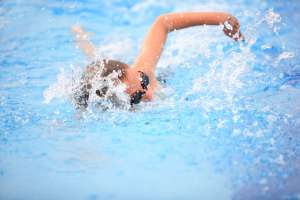Anyone considering taking swimming lessons is bound to hear some stories about what to expect. In fact, even veteran swimmers must regularly sort through an interesting assortment of supposed poolside dos and don’ts. Want to sort the truth from rumor? Here are five of the biggest swimming myths that you might still believe to this very day.
1) Good Swimmers Are Born, Not Made
Some people are convinced that they’ll never develop top-notch swimming skills. Instead, they believe that some of us naturally adapt to the water while others just don’t. There’s also a variation on this theme for older swimmers. It states that people who don’t learn how to swim as kids can forget about learning as adults.
The fact of the matter is that the vast majority of folks can develop solid abilities in the pool. In most cases, all that’s missing is a qualified teacher who knows how to work with students from various backgrounds. Patient teachers can help even the most pool-shy person develop sound swimming mechanics. And age alone is no bar for anyone who wants to start the process. You may not set any records (yet!), but you can swim with skill and confidence.
2) You Have to Wait an Hour or Two Before Swimming After Eating
This myth stems from the belief that food digestion pulls vital blood away from your legs and arms. Without this blood supply, it’s claimed, you’ll cramp up and potentially drown. However, studies conducted down through the years just don’t support the one-to-two-hour rule. Fewer than one out of every 100 people who drown have eaten before entering the water. In fact, some high-performance athletes eat just before they start swimming. The reason? Swimming burns calories and lack of food can keep the needed calorie supply too low.
3) You Don’t Need to Stay Hydrated When You Swim
Many people assume that you don’t need to drink hydrating liquids while swimming. After all, why would you need to drink water if you’re already in the water? In reality, swimming depletes your body’s fluid levels just like other types of aerobic activity. If you don’t keep your liquid intake up, you can overheat and experience problems such as dizziness and nausea. Some experts recommend hydrating with water if you swim for an hour or less. Sessions that last more than an hour may call for the consumption of an electrolyte-containing sports drink.
4) Swimming Isn’t Good Exercise
This myth is partially related to the false rumors about the importance of staying hydrated. Some people believe that you just can’t get a good workout through recreational swimming. The low-impact nature of swimming helps explain this belief. Since the buoyancy of the water takes stress off your joints, you may not “feel the burn” like you expect.
Despite this fact, swimming is recognized by fitness experts as a fantastic full-body exercise. To propel yourself forward in the water, you must engage essentially all the main muscles in your legs and arms. Also, you have to work the muscles in your back, abdomen, buttocks, and hips. Taken together, this widespread muscle use contributes to a significant aerobic load on your body. In turn, that aerobic load translates into improved cardiovascular function and calorie burning.
5) Chlorine Counteracts the Effects of Urine
Peeing in the water is not uncommon, especially in large public pools. Like many others, you may think that the disinfecting qualities of chlorine offset the effects of urinating. That might be true on a limited scale. However, studies show that the urine content of the average public pool hovers around 20 gallons. For urination on this scale, chlorine doesn’t provide adequate protection. In fact, in the presence of urine, body oils and sweat, it can create some dangerous byproducts. The list of these byproducts includes cyanogen chloride and trichloramine, compounds known to trigger problems in people with respiratory conditions. So, long story short; don’t do it!
Are myths about swimming keeping you out of the water? In any case, seek guidance from the qualified, experienced swim instructors at Blue Buoy. If you’re just starting out in the water, one of our friendly teachers can help you maximize the results of your efforts. And don’t assume you’re all set if you already swim for fun or competition. An instructor consultation may be exactly what’s needed to improve your experience or reach your goals. We offer a range of lessons suitable for children and adults, as well as high-quality facilities, flexible schedules, and reasonable prices.



Leave A Comment